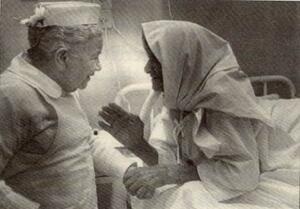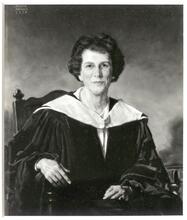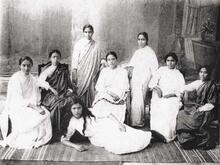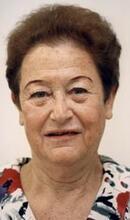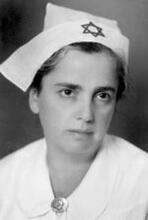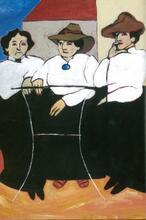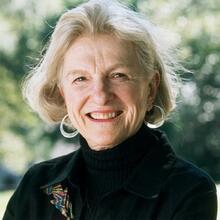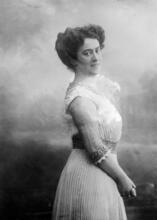Selma Mair
Selma Mair was born in Hanover, Germany, in 1884, and her mother’s death during childbirth when she was five years old influenced her decision to pursue a career in medicine. From 1906 to 1916 Mair trained and studied in a hospital in Hamburg, becoming in 1913 among the first Jewish women to be certified as nurses in Germany. In 1916, Dr. Moshe Wallach, on a trip to find a head nurse for Sha’arei Zedek hospital in Jerusalem, invited Mair to take the position. She accepted and quickly became an integral part of the hospital’s operations during World War I, when it faced several epidemics, and thereafter as a nurse and the primary teacher of nursing students.
Introduction
“Duty is pleasure,” wrote the Indian poet Rabindranath Tagore (1861–1941). Selma Mair (Schwester Selma), who laid the foundations of nursing at Sha’arei Zedek Hospital in Jerusalem, lived accordingly. A short, dynamic woman, she lived and worked at Sha’arei Zedek for 68 years until her death at age 100 on February 5, 1984.
From 1916 until the 1930s Selma served as the matron, in charge of all nursing in the hospital. She supervised and trained nurses, midwives, and operating-room nurses and also anesthetized patients with ether. Selma was also the house mother who looked after the state of the building, equipment supply, and the The Jewish dietary laws delineating the permissible types of food and methods of their preparation.kashrut of the kitchen. Throughout this time, she worked with Dr. Moshe Wallach (1866–1957), sometimes standing in for him as hospital director.
Early Life and Career
Selma Mair was born in Hanover, Germany, in 1884 to a poor family with five children. Her mother’s death in childbirth when she was five years old awoke in her a desire to give people a mother’s love.
From 1906 to 1916 Selma Mair worked as a nurse at Salomon Heine Hospital in Hamburg. She was trained in the hospital’s “basic” departments: internal medicine, surgery, pediatrics, and obstetrics. In 1913, Mair and another nurse were the first Jewish women to be certified as nurses under the German government.
Partnership with Dr. Wallach and Contributions to Nursing
In 1916, during World War I, Dr. Wallach traveled to Germany to search for a head nurse for Sha’arei Zedek. He chose Selma Mair, who was then 32 years old. Within a few weeks of arriving at the hospital in Jerusalem, she introduced the German system: whenever Dr. Wallach performed uterine curettages, tracheostomies, or circumcisions, Mair assisted him.
During World War I, epidemics broke out, including typhus and meningitis. The hospital had 150 beds at the time, almost twice the designated number, but the nursing staff was not professional. Mair was the only registered nurse and legend has it that during her reception hours the line reached all the way to the Mahane Yehuda market, a considerable distance.
In 1927 Mair considered leaving Sha’arei Zedek and was even offered the position of head nurse at a Jewish hospital in Leipzig. The board of directors of Sha’arei Zedek in Frankfurt persuaded her to stay and even promised to support her for the rest of her life.
During the 1929 riots in Hebron and other places, the wounded were brought to Hadassah and Sha’arei Zedek. At the time, Mair was ward nurse of the operating rooms, which had to keep long hours. During the polio epidemic of the 1950s, the isolation ward located outside the central building was much in demand and Mair trained the medical staff in the use of the “iron lung.”
A nursing school—the first attached to a religiously Orthodox hospital—was founded in 1936 with a curriculum similar to that of the British government hospitals. During its initial period of operation, Mair taught all the practical nursing classes. The school was founded “with the special aim of bringing young women from Nazi Germany to Palestine for professional training.” Until the founding of the state, it was the only Jewish nursing school where the students worked in the ward for contagious and tropical diseases.
Children and Legacy
Mair had three daughters by adoption. Samoohah Calderon (later Simhah Klein) came to Mairin 1916, when her mother died and her father and brother were drafted into the Turkish army. Bolissa was an orphan for whom Selma provided an education in Germany for ten years. Bolissa returned to Palestine, but was killed in the car bombing in Ben Yehuda Street, Jerusalem, during the War of Independence. The third girl, a sick child whose parents abandoned her, was called Sarina or Shifrah.
In 1974, when Selma was 90 years of age, Teddy Kollek, then mayor of Jerusalem, declared her a Worthy of Jerusalem. The following year, she appeared in a Time magazine article about women around the world who dedicated their lives to the alleviation of suffering.
Selma Mair’s life exemplified modesty, order, and devotion to her work in the spirit of the German tradition of nursing. She taught nurses “the secret of a human approach to patients.” Today, a photograph of Schwester Selma, founder of nursing at Sha’arei Zedek, hangs in the lobby of the hospital as a source of inspiration.
Bartal, Nira. “Theoretical and Practical Training of Jewish Nurses in Mandatory Palestine, 1918–1948, through the Prism of the Hadassah School of Nursing, Jerusalem” (Hebrew). Ph. D. diss., Hebrew University, Jerusalem: 2000.
Mair, Selma. Mein Leben und Erlebnisse im Shaare Zedek (My Life and Experiences at Sha’arei Zedek) (translated from the German by Trude Fraenkel). Jerusalem: 1973.
Yisrael, Nir, Tzippi Shapira, and Shoshana Metzger. Interview with author. Jerusalem, February 2002.

